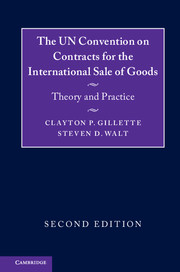Book contents
- Frontmatter
- Contents
- Preface
- 1 The CISG: history, methodology, and construction
- 2 The scope of the CISG
- 3 Contract formation
- 4 Implied terms and interpretation
- 5 Performance
- 6 Liability for nonconformity
- 7 Risk of loss
- 8 Exemption from performance
- 9 Remedies
- Appendix 1 The United Nations Convention on Contracts for the International Sale of Goods
- Appendix 2 CISG status table
- Table of cases
- Subject matter index
1 - The CISG: history, methodology, and construction
Published online by Cambridge University Press: 05 June 2016
- Frontmatter
- Contents
- Preface
- 1 The CISG: history, methodology, and construction
- 2 The scope of the CISG
- 3 Contract formation
- 4 Implied terms and interpretation
- 5 Performance
- 6 Liability for nonconformity
- 7 Risk of loss
- 8 Exemption from performance
- 9 Remedies
- Appendix 1 The United Nations Convention on Contracts for the International Sale of Goods
- Appendix 2 CISG status table
- Table of cases
- Subject matter index
Summary
THE CISG AS A SET OF COMMERCIAL DEFAULT RULES
The United Nations Convention on Contracts for the International Sale of Goods (“the CISG”) is one of the most successful international commercial law treaties ever devised. It has been ratified by most of the world's important trading countries and become a template for the manner in which commercial law treaties are drafted. As of this writing, the CISG has been adopted by eighty-three countries. These nations are referred to as “Contracting States.” Every major trading nation except India, South Africa, and the United Kingdom has ratified the CISG. Cases interpreting it currently number in the low thousands, and more than 135 United States cases have referred to the CISG. With unreported arbitration awards added, this number must be considerably higher. The effect of the CISG within a Contracting State may vary with domestic law. For example, within the United States, which ratified the CISG in 1986 and where it entered into force in 1988, the CISG is considered a self-executing treaty. The CISG therefore creates a private right of action in federal court under federal law. The CISG provides the default set of rules that govern contracts for the sale of goods between parties located in different Contracting States, and, in some cases, where only one of the parties is located in a Contracting State. Where applicable the CISG preempts contrary provisions of domestic sales law, such as Article 2 of the Uniform Commercial Code (“UCC”) and other state contract law in the United States, and conflicting provisions of the German Civil Code (“BGB”) or the French Civil Code.
The CISG is relatively well known and researched in Europe. The academic literature on uniform sales law is dominated by European scholars, and some of the methodological developments in legal analysis that have prevailed in the United States have been applied only sparingly to CISG scholarship. As a result, at least in the United States, the CISG remains an understudied, largely misunderstood, and somewhat esoteric body of law, unfamiliar to many American commercial lawyers. Many of its provisions are reminiscent of the Uniform Commercial Code, and many American attorneys and courts improperly infer that those similarities mean that the UCC and the CISG have identical scope and meaning.
- Type
- Chapter
- Information
- The UN Convention on Contracts for the International Sale of GoodsTheory and Practice, pp. 1 - 23Publisher: Cambridge University PressPrint publication year: 2016

